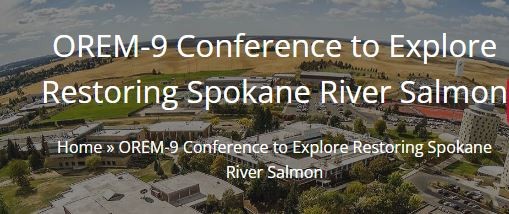Conference to Explore Restoring Spokane River Salmon - Sept 27
Tuesday, September 27, 2022

Eastern Washington University is cohosting a two-day dialogue in partnership with area tribes to examine the past, present and future of the International Columbia River watershed with a focus on indigenous people, restoring salmon and the Columbia River Treaty.
The One River Ethics Matter (OREM) conference will be held from 9 a.m.-12:30 p.m. on Tuesday, Sept. 27, and Wednesday, Sept. 28. Registration for the virtual discussions is free and open to the public.
This is the ninth year for the OREM conference, which is happening at a time when the United States and Canada are negotiating aspects of the Columbia River Treaty.
Hosted by the Spokane Tribe of Indians, The Coeur d’Alene Tribe and the Upper Columbia United Tribes, in partnership with the EWU Small Urban Rural & Tribal Center on Mobility, the conference will focus on righting historic wrongs, advancing stewardship and exploring who at the treaty negotiating table advocates for the salmon, the river and future generations.
ADDITIONAL INFORMATION:
OREM is an ethics consultation process that encourages dialogue about the past and future of the international Columbia River watershed with a focus on Indigenous people, restoring salmon, and the Columbia River Treaty and its future. This year’s OREM focuses on restoring Spokane River salmon.
For Indigenous people of the Columbia River and its tributaries, salmon were at their life’s center. Today, Indigenous sovereigns are stepping up as leaders throughout the Columbia River watershed to protect and restore rivers, fish and wildlife. Tribes, with broad support, are leading efforts to restore salmon above the Grand Coulee Dam to spawning waters of the upper Columbia River, including the Spokane River.
The Spokane River was once home to one of the most bountiful salmon runs in the entire Columbia River watershed. From time immemorial, Indigenous people gathered at Spokane Falls for the returning summer Chinook salmon. Salmon remain deeply important for Indigenous culture and sustenance.
Today, however, dams block returning salmon. The Grand Coulee Dam alone cuts off more than 40% of total salmon and steelhead habitat in the Columbia Basin.
OREM is supported by the Columbia Institute for Water Policy and Sierra Club. For more information, visit riverethics.org.